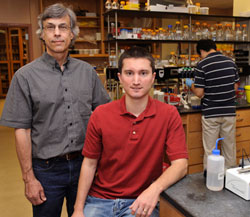An Iowa State University researcher has developed a new green, bio-based process for producing the fuel additive isobutene that could help ethanol production.
 ISU biochemistry professor Thomas Bobik invented a process for manufacturing the much-used fuel additive and industrial chemical that is currently made from petroleum by identifying a new, natural enzyme that produces the fuel organically. Isobutene is a gas used to produce chemicals and also in the manufacturing of fuel additives, adhesives, plastics and synthetic rubber. It can be chemically converted to isooctane, which is a fuel that could be used to replace gasoline additive methyl tert-butyl ether (MBTE), which can be environmentally harmful. Isooctane is used in gasoline to stop engine knocking and other problems. Currently, isooctane is produced from petroleum products.
ISU biochemistry professor Thomas Bobik invented a process for manufacturing the much-used fuel additive and industrial chemical that is currently made from petroleum by identifying a new, natural enzyme that produces the fuel organically. Isobutene is a gas used to produce chemicals and also in the manufacturing of fuel additives, adhesives, plastics and synthetic rubber. It can be chemically converted to isooctane, which is a fuel that could be used to replace gasoline additive methyl tert-butyl ether (MBTE), which can be environmentally harmful. Isooctane is used in gasoline to stop engine knocking and other problems. Currently, isooctane is produced from petroleum products.
Bobik, along with doctoral student David Gogerty (both pictured), believe that once more research is completed, there could be huge benefits to the biofuels industry since currently one of the biggest expenses in producing ethanol now is the cost of separating the ethanol from the water where it’s made. “Isobutene is a gas, so we can imagine that it will be easy to remove the isobutene from the vessel in which it was made, and that should be a very cheap and efficient way to purify the biofuel,” said Bobik.
One of the drawbacks, Bobik warns, is the process currently takes too long because the activity of the enzyme is low. “It’s too low for commercial application. So we’re trying to use directed enzyme evolution to improve the activity of the enzyme so it can become commercially viable,” Bobik said. Directed enzyme evolution is the effort to engineer enzymes to perform certain functions. In this case, it is trying to find a way to get the enzyme to produce isobutene more quickly than in nature.
Bobik says progress is being made rapidly and perhaps, within 10 years, motorists may be using a bio-based, environmentally friendly ingredient in their gas tanks every time they fill up.

